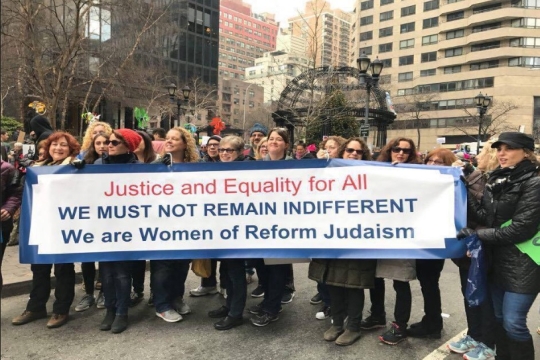
On June 18 at its annual Legislative Body Meeting, WRJ formally passed two resolutions: Preventing Gun Violence Against Women (2024) and Reaffirming Our Commitment to Reproductive Rights Post-Dobbs (2024).
WRJ Resolutions are formal expressions of the organization's stance on various social, political, and religious issues. These resolutions reflect the collective voice and values of WRJ.
The resolution on Preventing Gun Violence Against Women (2024) highlights the intertwined nature of gun violence and intimate partner violence. In the U.S., guns are involved in nearly two-thirds of intimate partner homicides, with a significant number of women threatened or injured by firearms. Similar patterns are observed in Canada, where nearly 80 percent of intimate partner violence victims are women. and access to firearms reveals itself as a major predictor of lethal outcomes.
The resolution also points out the racialized impact of gun violence. Indigenous, Black, AAPI, and Latina women in North America experience higher rates of intimate partner firearm homicide than white women. Additionally, LGBTQ+ communities face increased violence, with hate crimes and intimate partner violence affecting transgender and bisexual individuals at disproportionately high rates.
While the Violence Against Women Act (VAWA) offers important protections, gaps remain, such as the "boyfriend loophole," which allows certain domestic abusers to access firearms. Legal challenges, like United States v. Rahimi, have sought to further weaken existing protections. Rahimi, a convicted domestic abuser, was protesting a law that prohibited someone with a domestic violence restraining order from possessing firearms. The Reform Movement recently applauded the U.S. Supreme Court decision to uphold this regulation. In the press release on the decision, CEO of WRJ Rabbi Liz P.G. Hirsch declared that “there is still work to be done. Gun violence and domestic violence are lethally connected, and dangerous gaps persist in protections for survivors and future victims.”
Therefore, WRJ calls upon its sisterhoods, women’s groups, and individual members to
demand the following from their elected officials:
- Enact policy closing loopholes that allow for noted perpetrators of gender-based violence to access firearms, such as the boyfriend loophole.
- Enact policy protecting LGBTQ+ communities and shelters from violence, including gun violence.
- Fund research into gun violence as a public health issue to better understand the causes of and solutions to the current gun violence epidemic in North America.
The resolution on Reaffirming Our Commitment to Reproductive Rights Post-Dobbs (2024) addresses the critical importance of reproductive healthcare. Since the Dobbs v. Jackson Women's Health Clinic decision in 2022, governments across the country have restricted access to abortion and other reproductive health care services. Guided by Jewish teachings on respect for individual dignity and societal obligations to provide health care, WRJ continues to support abortion access.
Research consistently shows that access to abortion is vital for societal well-being. It correlates with lower crime rates, reduced childhood neglect, improved economic outcomes for women, and overall better long-term prospects for children. Public opinion also largely supports reproductive rights, over 62 percent of Americans in opposition to the fall of Roe v. Wade.
While the Dobbs decision did not outlaw abortion nationally, it gave states license to pass severe restrictions. Fourteen states have implemented complete bans on abortion, and nineteen states, along with the District of Columbia, enforce the Hyde Amendment's restriction on federal funding for abortion services. Similarly, in Canada, the availability of abortion services and their coverage under healthcare plans is determined by individual provinces.
A critical case recently before the Supreme Court, FDA v. Alliance for Hippocratic Medicine (2024) decided whether the continued accessibility of mifepristone and medication abortion would be hindered. Mifepristone and medication abortion options are a primary method of termination for many individuals. The decision struck down a challenge to the Food and Drug Administration's (FDA) regulation of mifepristone. By ruling that the plaintiffs lack legal standing to sue the FDA, the Court allowed mifepristone, a medication with a 99 percent safety record, to remain on the market.
The Court did not affirm the merits of medication abortion, but rather ruled on the technical question of the plaintiffs' standing to bring the case. It is essential that we continue to work to protect abortion access, including medication abortion, to ensure that future challenges, potentially by plaintiffs with stronger standing to bring such cases, are also turned back by the Courts.
Therefore, WRJ calls upon its sisterhoods, women's groups, and individual members to demand the following from their elected officials:
- Enact policy protecting the right to an abortion and reproductive healthcare across the United States and Canada.
- Enact policy ensuring medication abortion, including mifepristone, will remain legal and accessible.
- Enact policy to ensure birth control remains legal and accessible.
- Enact policy overturning the Hyde Amendment to ensure that abortions can be covered by federal funds including federal health insurance.
In today's quickly changing world, it is more important than ever for women to take charge and drive progress in their communities. WRJ makes this possible through Program Guides, which serve to translate these resolutions into concrete actions that sisterhoods, women’s groups, and individual members can undertake. These guides are not just about identifying problems; they are designed to cultivate solutions and empower women as leaders in advocacy efforts. These guides ensure that women's voices are heard, and their impact is felt. Look out for these guides on our website in the next few days!
Related Posts

Tea With Sandra, Ruth, and Amy

The Power of "Why Not?"



